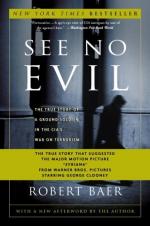|
This section contains 585 words (approx. 2 pages at 400 words per page) |

|
See No Evil: The True Story of a Ground Soldier in the CIA's War on Terrorism Summary & Study Guide Description
See No Evil: The True Story of a Ground Soldier in the CIA's War on Terrorism Summary & Study Guide includes comprehensive information and analysis to help you understand the book. This study guide contains the following sections:
This detailed literature summary also contains Topics for Discussion and a Free Quiz on See No Evil: The True Story of a Ground Soldier in the CIA's War on Terrorism by Robert Baer.
See No Evil by Robert Baer is the story of the author's career as a case officer in the US Central Intelligence Unit. As a young boy, he traveled Europe extensively with his mother. Although she pulled him out of school for the long vacation, she unknowingly exposed him to places in Europe and in Russia where he would one day serve as a dedicated case officer for the CIA.
As a high school student back in Colorado, he skipped school frequently to ski with his friends. He planned on dropping out of school and becoming a ski racer but his mother had a different vision for his future. She ended his ski-bum dream and placed him in a military school in Indiana. He did well at school and was accepted to Georgetown University in Washington, D.C. After graduating, he wound up in San Francisco where he stayed with a friend while looking for a job. On a lark, he applied with the CIA never dreaming he'd ever hear from them.
Robert was soon filling out volumes of papers and applications for the agency and was visited by a recruiter who convinced him to pursue a career as a case officer with the CIA. The recruiter explained that as a case officer, he would be assigned overseas where he would cultivate "agents" and gather intelligence about other governments and individuals who the US saw as potential threats to the security of the country. Robert wasn't overly enthused but liked the idea of being on his own and near the Alps where he figured he could spend a lot of time skiing.
After a year of arduous training at Langley, VA, CIA headquarters, and various other secret locales, Baer was given his first assignment in Madras, India. At the time, India was an ally of Russia and the US was anxious to learn intel about the Russian military and its weaponry. Although Robert botched his first "pitch" to a prospective agent, his superiors were impressed with the young man's attempt to bring in a "hard target."
Robert spent many years in the capitals of Europe and the Middle East. He gained expertise at assessing potential agents, bringing them under the CIA wing and gaining valuable intelligence from them that benefited the US in fighting terrorism and in understanding their enemies weaknesses and strengths. The impact of the embassy bombing in Beirut early in his career haunted him for decades. Six CIA officers died in the bombing and it seemed no one really cared other than Robert. Near the end of his career, he was able to piece the evidence together and uncover the mastermind and operatives behind the bombing.
As the years wore on, the culture and climate of the CIA changed drastically. The agency became politically correct and its leaders became fearful of stepping on the wrong toes. The State Department and the office of the National Security Adviser became obstacles in the CIA carrying out their responsibilities as a spy organization. Robert learned that many staff and officials of the White House were linked too closely to the oil companies. There was evidence of corruption and campaign-finance abuse. He decided to blow the whistle but no one wanted to hear what he had to say. Robert Baer, who loved his work and was a dedicated officer for over twenty years, turned in his resignation when he saw that monetary and political concerns trumped the security and lives of people.
Read more from the Study Guide
|
This section contains 585 words (approx. 2 pages at 400 words per page) |

|



